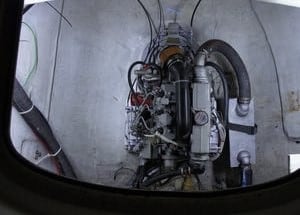
- Don’t start engines without checking fluid levels, belts, and raw water inlet.
- Do not permit engines to sit without running them for more than 7 days – try to operate engines at least every 5 days.
- When running engines, allow engines to warm up, then run at about 1500 RPM for about 5 minutes, then shut down.
- Properly lay up engines that are not going to be used for periods of greater than 30 days. Long periods of disuse result in serious internal engine rusting of cylinder walls and valves.
- Start engines with throttles in neutral. Do not race engines until they are up to normal operating temperature. This is very damaging.
- Avoid prolonged idling if possible, this can glaze the cylinders. Always run the engine at cruise speed or higher on the way home for at least 30 minutes to dislodge carbon deposits.
- Service fuel system immediately if excessive exhaust emissions occur.
- Always put the engine into forward and astern before casting off to make sure that your gear selector is working properly.
- On a catamaran, always start the engine farthest from the helm so you can hear that it has started to avoid running the starter with the ignition once the engine has fired.
- Always wait for the RPM to drop back to idle before changing gears from forward to astern or vice versa.
Engine maintenance should become a habit. Make a list of the things to check and diligently go over every item before you leave the dock.
This article, “Maintenance Fundamentals” by David Pecoe is great for reference.
Another great article by Tim Bartlett “Diagnose and fix marine diesel engine problems“.

Estelle Cockcroft
Catamaran Guru Co-Founder
Estelle Cockcroft is a seasoned sailor, catamaran expert, and co-founder of Catamaran Guru. With over 70,000 NM sailed and 30+ years aboard, she empowers new cruisers with expert advice on liveaboard life, yacht ownership, and ocean adventures.




